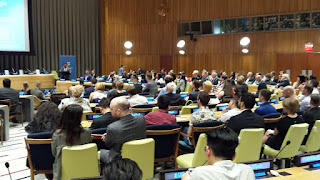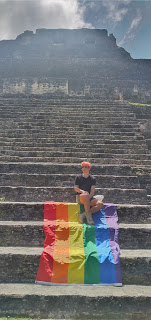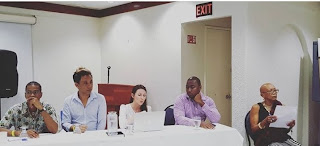Parliamentary Dialogue in the DR, does it matter in Belize
Posted 21st, October, 2013
I met two important persons at a meeting entitled, "Protecting Human Rights, Combating Discrimination and Addressing HIV/AIDS of Persons with Diverse Sexual Orientation and Gender Identities" that was organized by the Parliamentarians Global Action (PGA) which is network of 1,000 lawmakers in about 130 countries. The meeting was held at the Deputy of Chambers building, not too far from our hotel.
The first important person on my trip to Santo Domingo from the 9th to 11th October, 2013 was Fox Odoi Oywelowo a Ugandan parliamentarian who has a history of speaking about human rights issues like, violence against women and girls from prevention to legislative enforcement . He has also spoken against the the "Kill the Gay Bill" and reports confirm only two MP moved to block the bill. Sam Owor Otada of Kiryandongo confirmed attaching his signature to a minority report, but Oywelowo who was chairman of the Rules and Parliamentary Privileges Committee, did not confirm nor deny his authorship of the report, but simply responded, he could not " comment on something which is not yet on the floor of parliament." In a blog written by Melanie Nathan, February, 2013, she confirms the Odoi did write the report which had a number of conclusions:
The Minority report which was written in November 2012 notes:
3. While the Members agree that there is the need for children to be protected against recruitment by homosexuals, The Members disagree that this is the law to protect the children since a closer analysis of the Bill also reveals that there are no specific clauses that provide for the protection of children against recruitment. The Members argue that in that regard there is a need for a comprehensive law to protect children against more than just homosexual recruitment and sex. This other law can protect children against child labour, violence, sexual exploitation, female genital mutilation, slave:ry and trafficking.
4. It should be noted that Uganda belongs to an International Polity and cannot afford to exclude herself from the rest of the world by way of enactment of this law. The introduction of this law contravenes many International conventions and treaties. which are already ratified by Uganda; Such as;Fox Odoi Oywelowo is a very unassuming man, but dig deeper and one discovers that he is part human right advocate, all politician and a product of his environment where a lack of understanding about sexuality can permeate public statements and influence legislative process in parliament.
• The .African Charter on Human and People’s Rights (The Banjul’s Charter) ratified by Uganda on 10th May, 1986.
• The International Covenant on Civil and Political Rights (ICCPR) • International Covenant on Economic, Social and Cultural Rights (ICESCR)
Whether one agrees with the conclusion of his minority report or not, as an advocate, his parliamentary responses to the "Kill the Gay Bill" offers an important intellectual journey on lessons about communication and dialogue between parliamentarians in Belize. I did ask him in person what makes him carry on and he believes that the violation of one groups rights, is a threat to all. Professionally, he has been a Senior Principal State Attorney, worked at the Ministry of Justice and Constitutional Affairs, acted as presidential adviser, Legal Affairs and has been a member of Parliament. What I like about this parliamentarian, is that he took a parliamentary stance in a time of great band wagon mentality among his colleagues, he is open to learning about the issues of gender and sexuality and is humbly enough to say he does not know.
The next important person I met was MP Minou Travarez Mirabel, Chairman of the Foreign Affairs Committee for the Chamber of Deputies of Dominican Republic and Chair of International Council of PGA. Minou, is a philogist, professor and politician Mrs. Tavárez has served as deputy for the National District in the lower House since 2002; and served as deputy foreign minister from 1996 to 2000. Minou is daughter of Dominican lawyers and activists Manuel Aurelio Tavarez and Maria Argentina Minerva Mirabel both founders in 1960 of the opposition movement that sought the overthrow of dictator Rafael Trujillo. Her mother was killed by the dictatorship in 1960, and her father was murdered by the Tirumvirate (three-member junta) that overthrew Juan Bosh's legitimate government in 1963, becoming an orphan of both parents at the age of 7 years. Her parents are considered martyrs and national heroes.
This incredible MP shared that a few years ago the church had organized a slanderous campaign against her and 31 other parliamentarians who oppose language around abortion to be placed in the constitution. Though they lost the war on preventing the language, what she herself proved was that a politician can take a principal stance on an issue and still survive the church opposition. She shared that she not only got re-elected, she got the highest votes in her area. This is not her only time, she recently took a public stance, in response the the de-nationalisation of Haitians borne in the Dominican Republic, in a speech, recently, she can be quoted as saying, " One of the first consequences of the decision of the Constitutional Court is that it has brought to the fore the worst of ourselves"
The importance of profiling parliamentarians cannot be over stated as it has parallels for Belize 's PM speech on September 21st, 2013, Lisel Alamilla willingness to called the UniBAM effigy for what it was when it was shown in the constitutional march in the South of Belize, the Leader of the Opposition statement of inclusiveness and the Special Envoy comments on the Day Against Homophobia and Transphobia. Transforming public statements and policy documents like the Revised Gender Policy, the current legal review of the National AIDS Commission, the current legal challenge to section 53 will remain a balance of dialoguing with litigation. Nevertheless, academic engagement like this panel below had as opportunity to promote understanding and to refine parliamentary perceptions that allows for an honest conversation about gender and sexuality from a legislative prospective.Learning that the use of the word sexual orientation and gender identity need not be in a constitution for the constitution to offer protection was evident by the Uruguayan presentation.
The Uruguayan MP Berta Sanserrino spoke
of the many laws on the books for her country and that much could be done to
address the social inequalities in her country. She spoke of the gradualism
process around relationship protection and the additional considerations around
education and health law. See below for the reference and language of the laws:
Law
against Racism, Xenophobia and Discrimination (2004):
National
interest is declared the fight against
racism, xenophobia and all forms of discrimination. Discrimination means any exclusion, preference, performance of
physical and moral violence on the basis of race, color,
religion, national or ethnic origin,
disability, aesthetics, gender, sexual
orientation or identity, that undermines equality, human rights and freedoms.
Rights an obligation to health services
(2008)
In Article 2 states that patients and users of health
care services have a right to be treated equally and not
be discriminated against for any reason,
such as race, age, sex, religion, nationality,
disability, social status, educational level , property,
choice or sexual orientation.
Right to Sexual and Reproductive Health
Law (2008)
The law states that the State shall ensure the conditions for
the full exercise of sexual and
reproductive rights of all people.
For this, national policies promote sexual and
reproductive health, and design programs according to the principles of the law ..
General
Education Law (2009)
In Article 18 that
the State shall give specific
support to those who are vulnerable,
and will seek to include people who are discriminated against culturally, economically or socially. Also stimulate the
transformation of discriminatory stereotypes based on age, gender, race, ethnicity or sexual
orientation.
Article 40 states
that the national education system as transverse lines contemplate
human rights education and sex education (among others).
Sex
education will aim to provide appropriate
tools to promote in teachers and
learners, critical reflection to gender
relations and sexuality in
general for responsible enjoyment
of it.
Sexual Harassment (2009)
The law seeks to prevent and
punish sexual harassment and protect victims. Sexual harassment is defined as any behavior of a sexual nature made by a person of the
same or opposite sex, unwanted
by the person to whom it is addressed, and whose
rejection causes him injury in
their workplace or education, or creates an
environment intimidating or hostile to the recipient.
Civil Union Law (2008)
Concubinary
union is considered community life of two
people, regardless of their sex, gender identity,
sexual orientation or preference, that
maintaining a loving relationship of a
sexual nature, unique, singular, stable
and permanent, without being united
in marriage.
The benefits
of the
law apply to couples who live
in these conditions at least five years, couples who have lived at least
five years and are
separated, people whose partner
has died after living at least five years
Some
Benefits include:
- The joint ownership of property acquired
during the adoption of concubinage and in
subsequent
- The possibility of separate property
- The ability to receive child support
after separation or death
Marriage Act 2013:
This bill makes changes to the
Civil Code to
ensure access to marriage for
couples whose members are of any sex or gender identity.
Article 83 of the Civil Code now states that civil marriage
is a permanent union, under the law of two
persons of the same or opposite
sex. The children born within marriage
homosexual (adopted or conceived) take the
surnames of their parents in the order
they choose
Right to gender identity and change of name and sex on identity
documents - 2009
Article 1 states that everyone has the right to free development of
his personality according to their
own gender identity, regardless of
their biological sex, genetic, anatomical,
morphological, hormonal, or other
assignment is.
This right includes freedom
to be identified in a way of recognizing their gender identity, and the right to have
their identity documents match
identity and name
Those who can benefit from the law:
- Those whose name and / or sex does not match
their gender identity.
- Seniors with at least two years living with their identity (even without having had sex reassignment surgery)
- People who have had sex reassignment surgery
- Minors with parental
consent. If the parents
do not agree, you can perform the
procedure with a guardian
and a lawyer to assist him.
Law Content:
- Access to an identity card, passport polling card and identity and name
recognition with which the person chooses to live.
- Change the necessary documentation
on your behalf.
- Access to social benefits to sex recognize that
recorded in the document.
Modification of provisions of the Code on Children and Adolescents on adoption – 2009
- They can take individuals or couples who are spouses or partners, over 25 years.
- They may take one of the partners, with respect to the son of another member, if it has no legal
relationship with the other parent.
- The adopted child's affiliation
links are replaced by the adoptive family,
but the child can maintain regular links with their birth family.
- The adoption means that the child will have the same rights as
if born of the adopter. The goal is to ensure children's rights to family life and to ensure their integration into
the new family with all the rights.
Article 40 states that the national education system as transverse lines contemplate human rights education and sex education (among others).
Article 83 of the Civil Code now states that civil marriage is a permanent union, under the law of two persons of the same or opposite sex. The children born within marriage homosexual (adopted or conceived) take the surnames of their parents in the order they choose
Belize had the
chance to speak about its liberal constitution, section 3 protections, its
sexual harassment laws, its gender neutral reference to adoption,
constitutional redress clauses, the PM statement, the Gender Policy and its
opposition as well as the effects of the state indifference and tendency by
omission to exclude LGBTI citizenry out of legislation. The result is the intensification
of functional impunity by non-state actors who publicly justifies why
mistreatment should occur and why harm is acceptable. This creating a pool of denialists who sees rights protection and enforcement as an affront their their beliefs. What we learned from this session is that gender neutral or generic
language will suffice in advancing LGBT concerns. We learned from our peers in
Santo Domingo when they wanted to march, they pulled out section 39 of their
constitution which spoke of non-discrimination base on any human condition.
The
2nd day of the meeting was about refining a parliamentary
declaration that called for parliamentarians of the Dominican Republic to act
and repeal discriminatory laws, act to enforce and implement protective laws
around SOGI issues and to invest in public education efforts around human
rights among other things. At the end of negotiations,
parliamentarians present agreed to sign on the declaration. CARIFLAGS issued
its own call pointed out Caribbean state inadequate responses to international
treaties like only 5 are party to the American Convention on Human Rights, just
two accept the jurisdiction of the Inter-American Court etc. The call issued 15
points which called n Caribbean Lawmakers to 1). Approve, ratify and bring into
force in domestic law the inter-American Convention against All Forms of
Discrimination 2).Ensure full implementation of the commitments contained in
the five annual organization of American States General Assembly resolutions on
Human Rights, Sexual Orientation and Gender identity/expression in their
domestic law and policy;3) include LGBTI
communities in governance, public planning and consultation among the 15 points
for a call to action among parliamentarians.
The
history of the Dominican Republic is a history of racial tension and
dictatorship. The dictator back in 1961 was Rafael Trujillo. It was reported he massacred an
estimated 20,000 Haitians in a border dispute along with 20,000-50,000 of his
own people during his rule of the country. What triggered an end to his rule
was the murder of the mirabal sisters, four Dominican political dissidents who
opposed the dictatorship of Rafael Trujillo. On November 25, 1960, three of the
sisters were assassinated. They were, Antonia María Teresa Mirabal, Patria
Mercedes Mirabal, María Argentina Minerva Mirabal, Bélgica Adela Mirabal-Reyes
survived. In 1999, the sisters received
recognition by the United Nations General Assembly designated November 25 as
the International Day for the Elimination of Violence against Women n their
honor.
Belize does not have this kind of violent past as a country, it has never has an assassination of our PM or mass killing sanctioned by the state at the level of Rafael Trujillo dictatorship. We have never had the level of experience in parliament around the Ugandan, "Kill the Gay Bill" so we have no reason to not to advance quickly in rights protection and enforcement legislation. Time will tell whether the Belizean LGBT community will express a desire to push things forward or remain passive aggressive in how it addresses its needs.
The
history of the Dominican Republic is a history of racial tension and
dictatorship. The dictator back in 1961 was Rafael Trujillo. It was reported he massacred an
estimated 20,000 Haitians in a border dispute along with 20,000-50,000 of his
own people during his rule of the country. What triggered an end to his rule
was the murder of the mirabal sisters, four Dominican political dissidents who
opposed the dictatorship of Rafael Trujillo. On November 25, 1960, three of the
sisters were assassinated. They were, Antonia María Teresa Mirabal, Patria
Mercedes Mirabal, María Argentina Minerva Mirabal, Bélgica Adela Mirabal-Reyes
survived. In 1999, the sisters received
recognition by the United Nations General Assembly designated November 25 as
the International Day for the Elimination of Violence against Women n their
honor.
Belize does not have this kind of violent past as a country, it has never has an assassination of our PM or mass killing sanctioned by the state at the level of Rafael Trujillo dictatorship. We have never had the level of experience in parliament around the Ugandan, "Kill the Gay Bill" so we have no reason to not to advance quickly in rights protection and enforcement legislation. Time will tell whether the Belizean LGBT community will express a desire to push things forward or remain passive aggressive in how it addresses its needs.
Hon.
Fox Odoi, MP West Budama North and Sam Owor Otada of Kiryandongo have
authored a minority report condemning the original work and general
report made by the committee. - See more at:
http://chimpreports.com/index.php/news/politics/9316-mps-move-to-block-anti-homosexuality-bill.html#sthash.IeL5DOUF.dpuf








Comments
Post a Comment